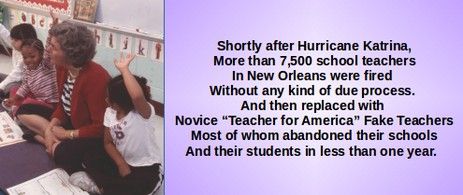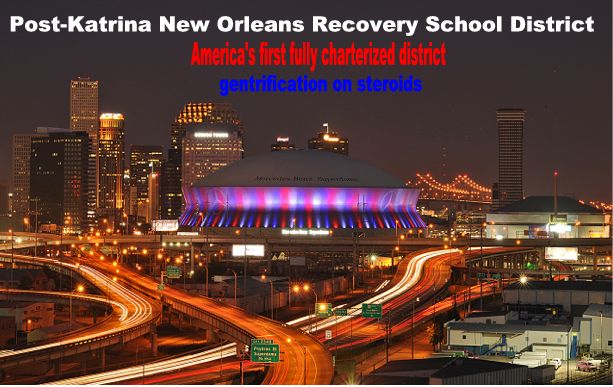What happened when a city full of teachers, most of them black, was fired
Research shows that half of the 4,300 New Orleans teachers fired after Hurricane Katrina never taught in Louisiana again

In the wake of Hurricane Katrina, thousands of New Orleans teachers were summarily dismissed after the Louisiana Legislature voted to turn over all but a handful of the city’s schools to the state-run Recovery School District. The Recovery District eventually converted all of those schools into public charter schools. This decision not only fundamentally altered how the city’s schools are run but also upended a profession that launched thousands black New Orleanians into the middle class. A new study from the Education Research Alliance at Tulane University shows that half of the teachers fired never worked in Louisiana public schools again.
Pre-Katrina New Orleans schools were a bit of an anomaly. In 2003, just 15 percent of teachers in large urban districts across the country were black but in New Orleans, teaching was largely a job done by black women: 71 percent of teachers were black and 78 percent were women. The demographics of the city’s teacher workforce have changed drastically since: in 2014, black teachers comprised a little less than half of the city’s teacher corps.
Related: What’s wrong with white teachers?
In the years following Katrina, New Orleans became a mecca for new teachers. Before Katrina, the city’s teachers had an average of 15 years of classroom experience. Now the majority of teachers have less than five years of experience. Jane Arnold Lincove, a professor at the University of Maryland, Baltimore County and the study’s lead author, says that the study suggests that the prospects for those veteran teachers fired after Katrina only got worse over the years, as more schools went charter and those schools embraced younger teachers recruited through programs like Teach for America.
The study highlights two years of employment records to show how pre-Katrina teachers fared as the reforms took hold. In 2007, the second full school year after Katrina, those teachers made up a large share of the city’s educators, but they subsequently started to leave the city’s schools in large numbers.
“Some of that could be teachers retiring, but it could also be that even if they got hired they might not have been the kinds of teachers the charters wanted,” said Lincove. “Veteran teachers get paid more, they might have been cut to help schools meet their budgets. We don’t know if a teacher left a school voluntarily or because they were forced out, but what we do know is that when exiting teachers were replaced they
What happened when a city full of teachers, most of them black, was fired - The Hechinger Report:
Building educational “success” on the backs of fired black teachers
Was the human cost of New Orleans’ school choice reforms really worth it?


How did New Orleans prove urban-education reform can “work”? By firing and replacing the black workforce of course.
For many, the New Orleans experiment is an example of what is possible in education reform. And the mass firing of mainly black teachers and school personnel in the aftermath of Hurricane Katrina is shamefully justified by increases in test scores. Only white reform apologists accept this as a worthwhile tradeoff. New research finally confirms what New Orleans’ black community knows too well: the “success” came at the great cost of rejecting black talent.
“While the educational implications here are ambiguous, what is clear is that the mass dismissals have had a lasting impact on the teachers themselves, their families, and the community,” according to the latest report from the Education Research Alliance (ERA) at Tulane University.
There are too many nefarious ways to close an achievement gap. Success must also mean increasing graduation rates in high school and college. It calls for reducing the rate kids are disciplined, removed from school, incarcerated, and entered into the criminal justice cycle. Success demands reducing student debt. And in the long term, it must mean ensuring opportunities to work in the city in which you live. Black teachers had always been a bulwark of the middle class – by taking away the opportunity to teach in their community, you remove a proven route out of poverty.
As Los Angeles and Las Vegas try to create their own Katrina to reform their districts, weakening labor unions and firing local talent are seen as successes in themselves. But we have yet to study the negative consequences of New Orleans reform. Twelve years after the storm, researchers at the ERA provide statistics on the still open wound in their newly released study, but it provides no salve. It only Building educational “success” on the backs of fired black teachers - The Hechinger Report - http://hechingerreport.org/?p=33615

